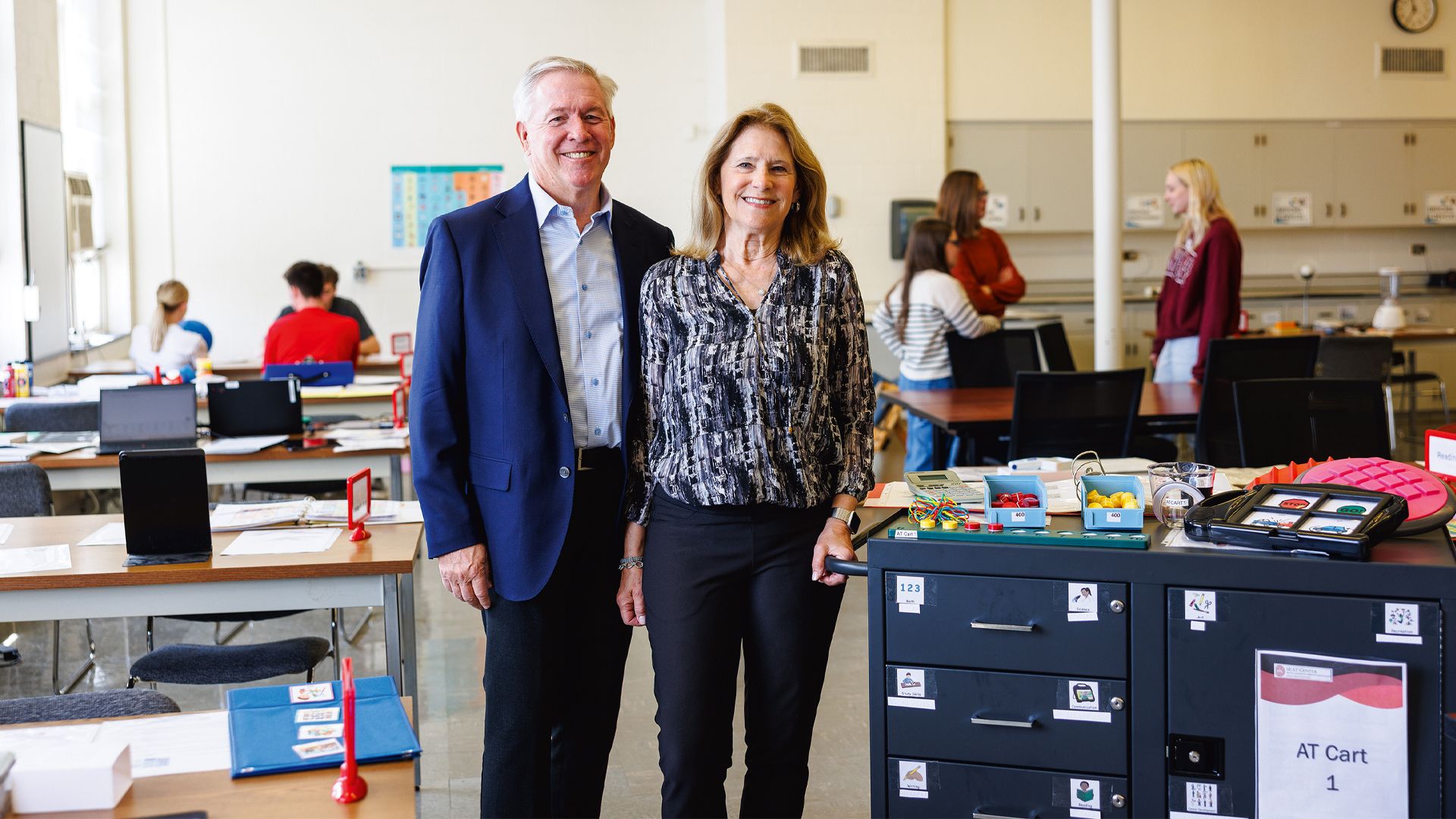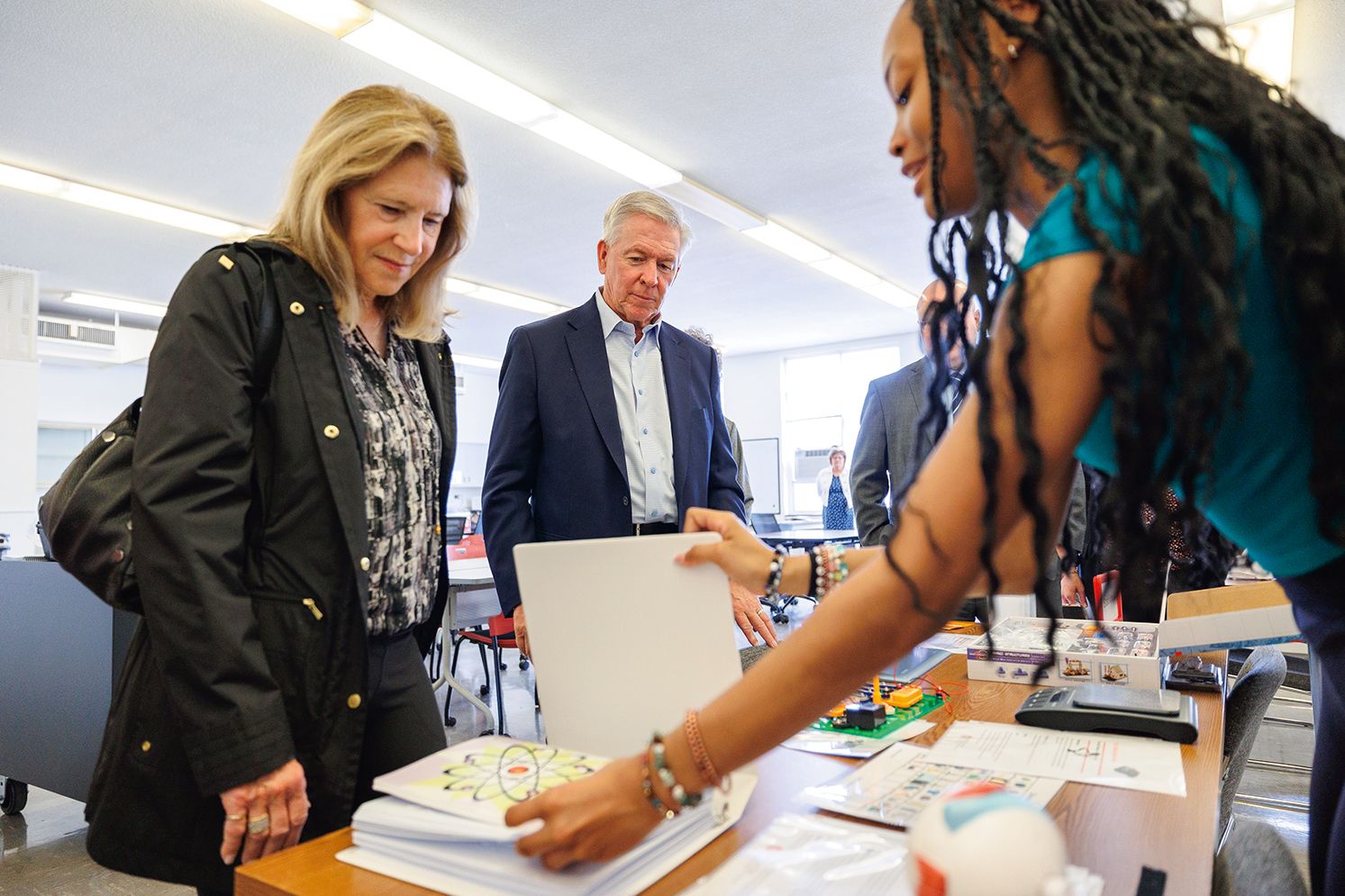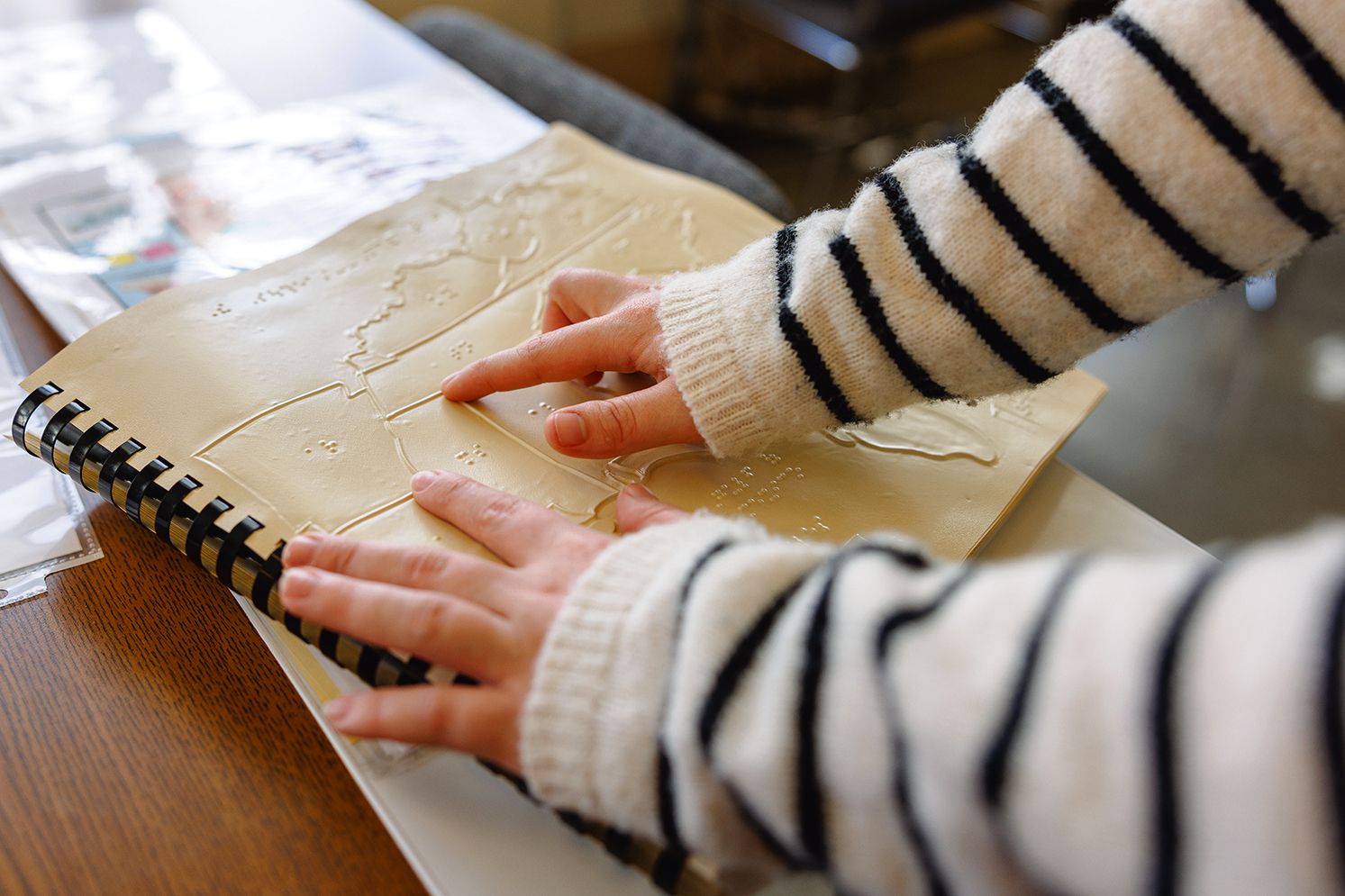EXPANDING
ACCESS and INCLUSION
Hagge donation powers new assistive technology at Illinois State

Thanks to you
Sharon ’73 and Steve Hagge ’73
By Molly Davis
Steve and Sharon Hagge have always had an appreciation for innovation and recently established the Sharon and Steve Hagge Endowment for Innovation in Education in the College of Education (COE).
“Innovation for us is the process of creating new ideas, products, or methods that improve upon existing solutions and solve problems in novel ways,” said Steve Hagge. “It was very important in my business career and when we looked at education, we felt that that it could play a key role in shaping future education.”
Sharon Hagge graduated with a degree in special education-low vision and blindness from Illinois State and spent over 23 years in elementary classrooms. In 2019, the Hagges established the Hagge Innovation Institute in the College of Business, and after that experience, Sharon wanted to make an impact on future teachers.
“I am absolutely thrilled that the College of Education is going in the direction of special education,” said Sharon. “Technology is just an important aspect of education and our daily lives, and we know that one size doesn’t fit all students.”
Steve and Sharon are excited that this first year, the gift will be focused on special education needs and helping prepare all teacher education students to support students who use assistive technology.
“We hope that this gift has a broad impact across the University and that it’s flexible to evolve and adapt with the world and changes in teacher education,” said Steve.
Todd McLoda, former interim COE dean, is excited for the philanthropic support and the vision that this gift represents for the college.
“This is truly a transformative gift for the college,” said McLoda. “I am grateful for the generosity of Sharon and Steve and their support of teacher education at ISU. In the first year of the fund, and possibly the second year, we are supporting assistive technology that can be utilized throughout teacher education and taken to Illinois school districts for institute days. Future investments that are possible from this gift include the application of artificial intelligence and virtual reality in teacher preparation. The vision of the Hagges to support innovation in teacher education is so impactful and will enrich our teacher education programs for decades to come.”
As Sharon reflects on her time at Illinois State, she fondly recalls the opportunity to work at Thomas Metcalf Laboratory School and her student teaching experience at the Indiana School for the Blind. She also loved her Braille classes and recalls checking out the heavy Braillers and taking them home to complete her homework.
“I received a well-rounded education at Illinois State, and one of my favorite experiences was working at Metcalf, as that was invaluable to me to have the one-on-one experience with an individual student,” Sharon said.
As she thinks about the future, Sharon encourages Redbird Educators to be lifelong learners and to participate in all of the professional learning programs offered in their district and state. She knows that her Illinois State education and dedication to continuous learning helped her become a great teacher.
Gifts and scholarships uplift and reward future educators. To learn more about establishing an endowment or scholarship within the College of Education, contact Executive Director of Development Joy Hutchcraft at (309) 438-8041 or jdhutch@IllinoisState.edu.

Sharon and Steve Hagge learn about inclusive science materials with Kaylissa Bess, sophomore biology education major.
INNOVATING with ASSISTIVE TECHNOLOGY
By Aubrey Henson
Thanks to the new Steve and Sharon Hagge Endowment for Innovation in Education fund, this year, the Special Education Assistive Technology Center (SEAT) is transforming how future educators learn to create inclusive classrooms.
Assistive technology (AT) includes tools that support people with disabilities in everyday tasks such as reading, writing, communicating, or participating in physical activity. The SEAT Center has long provided hands-on AT training to future teachers, but many of the tools were outdated or limited. The Hagges’ gift changed that.
With their support, the SEAT Center added more than 90 new tools to its inventory ranging from high-tech software to tactile, hands-on resources.
Some of the new additions include:
• Read&Write: A comprehensive literacy tool offering text-to-speech, translation, and note-taking features
• Adaptive physical education equipment: Sensory balls, talking timers, and bowling ramps
• Braille-enabled science and math tools: Including beakers, rulers, and tactile maps
• Accessible games and leisure tools: Including Braille UNO cards and talking watches
• Noise level readers: Helping educators create sensory-friendly spaces
Each tool is paired with a custom reference guide created by student workers and faculty. These guides explain the tool’s purpose, suggest classroom activities, and include QR codes that link to demonstration videos, empowering both new and experienced teachers to explore assistive technology with confidence.
“We’re intentionally planning to train all educators—special educators and content-area educators—about AT so they can integrate it into their lesson planning,” said Dr. Kim Fisher, an associate professor and SEAT Center director. “This kind of preparation just isn’t happening in most teacher prep programs.”
While AT has often been associated mainly with special education, Illinois State is expanding that perspective. In courses like SED 344, general education majors now learn how assistive tools can support students across all content areas.
“Our students—especially general educators—need to know what this technology is and how to use it,” Fisher added. “That way, they can plan lessons that truly include every student, whether they’re in a civics class, a chemistry lab, or on the marching band field.”
Looking ahead, the SEAT Center plans to launch SEAT on the Road, a statewide outreach program that brings assistive technology carts to high schools across Illinois. The goal is to introduce these tools to students in educator prep and STEM classes, raise awareness about inclusive practices, and inspire the next generation of teachers and problem-solvers.
The center also plans to collaborate with school districts to offer targeted professional development using the new carts and guides. These efforts will help districts expand inclusive teaching—especially among general education faculty who work closely with students who use AT.
The Hagge family’s donation is more than a gift. It’s an investment in equity, innovation, and the future of education in Illinois. Their generosity helps Illinois State prepare educators who are skilled in their subject areas and deeply committed to meeting the diverse needs of all learners.

Kaitlyn Crawford, junior specialist in low vision blindness, demonstrates how to use tactile maps.